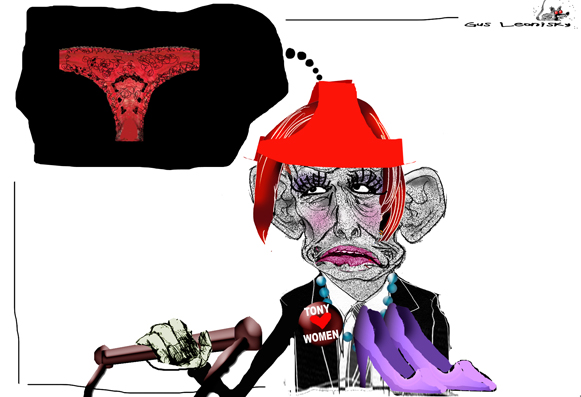Search
Recent comments
- struth....
1 hour 40 min ago - earth....
2 hours 21 min ago - sordid....
2 hours 44 min ago - distraction....
3 hours 2 min ago - F word....
4 hours 4 min ago - not losing....
9 hours 16 min ago - herzog BS....
9 hours 39 min ago - freedom to say.....
12 hours 35 min ago - wanton barbarism....
1 day 1 hour ago - little nazi....
1 day 3 hours ago
Democracy Links
Member's Off-site Blogs
budgie-smugglers dreaming...

Sometimes you do have to bash down the doors of prejudice with blunt force. But quotas won't help women who have turned away from certain careers because they were designed by men with no other demands, writes Michael Bradley.
Women comprise 50 per cent of the Australian population and, for at least the past 40 years, it's been generally acknowledged that they are not inferior to men. Any statistician can tell you that, in the absence of any relevant difference between the sexes in terms of their fitness for a particular occupation, and in the absence of any structural obstacle to either gender's ability to access it, by now we would well and truly have achieved 50 per cent representation by women within that occupation.
The particular occupation under present scrutiny is membership of Parliament (30 per cent women) and, more specifically, the subsets comprising the Parliamentary Liberal Party (22 per cent) and the Federal Cabinet (10 per cent).
We all agree that women and men are equally fitted to be MPs; therefore the only possible reason why those percentages are so much lower than 50 per cent is that there are one or more structural barriers to equality.
http://www.abc.net.au/news/2015-08-27/bradley-we-need-to-restore-balance-to-work-lives/6726052
- By Gus Leonisky at 27 Aug 2015 - 4:59pm
- Gus Leonisky's blog
- Login or register to post comments
quotas...
Given the slow rate at which the representation of women in decision-making bodies around the world is increasing, various positive action measures, such as electoral quotas, have been proposed or implemented to address the present gender imbalance in decision-making. Governments and political parties have experimented with different types of quotas; electoral quotas may be constitutionally or legislatively mandated or take the form of voluntary political party quotas. They usually set a target or minimum threshold for women, and may apply to the number of women candidates proposed by a party for election, or they may take the form of reserved seats in the legislature.
As the debate about the use of quotas as a measure to increase the political participation of women gains momentum, International IDEA is collaborating with Stockholm University in a global research project on electoral quotas for women. The project is the first global comparative analysis of the discursive controversies about quotas and how they work in practice.
Key Activities:
Electoral Quotas for Women Website
- The Electoral Quotas for Women Website provides an overview of the use of electoral quotas for women worldwide. Data is presented for over 90 countries, including 74 countries where quotas have been implemented in the constitution, regulations and laws or where political parties have implemented their own internal quotas.
----------------------One of the shameful position on this subject is most of the so called "First World Countries" are the least inclined to submit to quotas for women. These countries favour the Boys Club quota...